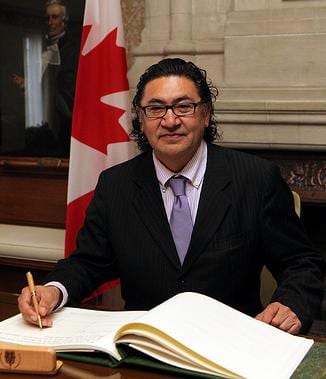Romeo Saganash is one of eight candidates running to replace Jack Layton as leader of the federal NDP. Xtra writer Jorge Antonio Vallejos spoke with Saganash about his work in aboriginal communities and how he plans to get out the vote.
Xtra: What sets you apart from the other candidates?
Romeo Saganash: If you consider me with the rest of the other candidates I think I have a very unique history. And it’s that experience of bringing people together. The agreements that I’ve managed to negotiate were meant to bring people together. That’s what I’ve been doing all my life. I’ve worked with industry, forestry, mining, Hydro Quebec; I’ve worked with the government. I’ve gotten everybody to work together, to move forward. And that’s the only way it can be done.
So, my track record is there to prove that. Everybody can consider that. I think it’s that unique experience I have that distinguishes me from the few.
With the political left divided in Canada, would you consider aligning with other parties?
No. Absolutely not. I think the foundations that Mr Layton laid for this party are very solid, very strong, and I don’t think the NDP needs to merge or form alliances with other parties. I think our party is a stand-alone party, very strong, very solid. We are the Official Opposition right now. And we’ve demonstrated that we have a strong team in the House of Commons. And I think we can prove that this party can form the next government.
What will you do to address homophobia in Canada, including on reserves?
Same thing with the school boards and schools, I think. I think that is something that needs to be worked out in partnership with everybody concerned, including chief and council, the various services and agencies that exist on reserves. And of course, the provincial and federal governments can certainly be partners in that endeavour.
A problem in the queer community is that two-spirit and trans people are often left out of the discourse and tokenized when they are mentioned. What will you do to include these people and increase their visibility?
Well, I think there are a lot of ways to do that. And it’s a two-way street, by the way. We need to recognize their rights, that they are equal to every citizen in this country. That’s something that’s extremely important. It’s a first step to say, “Yes, they are equal.” And from there I think there are many alliances and strategies that we can put in place in partnerships with them to do whatever is necessary.
If you consider Montreal, for instance, and the various activities that they have in Montreal every year, there are activities of integration and partnership with the various communities, LGBT communities. So there are a lot of ways of doing it. It’s just a matter of being innovative and creative and addressing that issue.
Something rarely spoken about in Canadian media and the political realm is that hundreds of aboriginal women have gone missing and been murdered in Canada in recent years. Will you bring this issue to the larger Canadian public?
We’ve done it a lot. We’ve met with the people that are working on that issue, both in Ottawa and in the streets. And the NDP has been supportive of their endeavours. We will continue to assist them and support them in their demands for a full national inquiry on the situation. I think the work has started in that direction with the NDP at least, and I think this is a matter of continuum.
What are your aboriginal elders saying to you? Are you consulting with your community elders?
Well, I’m consulting with everybody, not just the elders. I’m consulting with the youth, the environmental groups, the human rights groups. I’m consulting with previous candidates or candidates that did not make it this time. I’m consulting with everybody. It’s a wide range of consulting that I always have, that I’ve always had over the last 25 years. I have a network of friends and people that provide opinions, advice and support. That will not change.
You have spoken about the fact that many aboriginal people don’t vote. The same is often said about queer people of colour. How do you plan to get those votes?
Well, I think if you don’t show up in a democracy you cannot bring change to society. It’s that simple. So I’ve been telling this to a lot of groups: women’s groups, aboriginal groups, First Nations communities, chiefs and council, youth, whether aboriginal or not. I think it’s important for those 40 percent who do not show up, if they do not show up they cannot complain and certainly cannot bring change. So, I think it’s important for everybody to understand that.

 Why you can trust Xtra
Why you can trust Xtra


